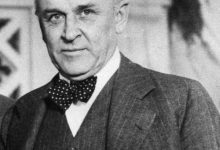Biography of Heinrich Hertz; Electromagnetic wave detector + images

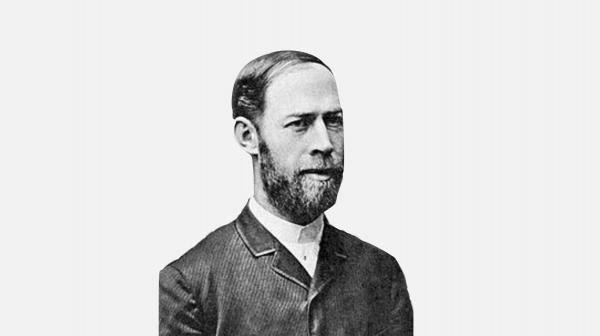 Heinrich Hertz, German physicist
Heinrich Hertz, German physicistAn abstract of Heinrich Hertz's biography
Full name: Heinrich Rudolf Hertz
Date of birth: February 22, 1857
Place of birth: Hamburg, Germany
Died: January 1, 1894 (37 years old)
Known for: Discoverer of electromagnetic waves and the photoelectric effect
Field of study: physics, electronic engineering
Biography of Heinrich Hertz
Heinrich Hertz, an outstanding German physicist, was born on February 22, 1857 in the city of Hamburg. He was born in a rich family. His father is Dr. Jur. Gustav Ferdinand Hertz was a Jew who converted to Christianity. He was a defense lawyer in Hamburg and from 1887 he was a senator and head of the justice department. His mother, Anna Elisabeth, with the surname Pfefferkorn, was the daughter of a doctor in Frankfurt. After attending a private school, Heinrich prepared himself by private study for the Johannium School, where in 1875, after only one year of study, he passed the Abitur (GCE A-levels) He got the best grades. In his class, he showed early interest in natural sciences and practical skills in making physics equipment in his family workshop. He was also keen on learning languages and studied Arabic and Sanskrit.
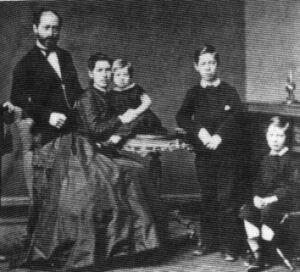 Hertz family with sons (second from right is Heinrich)
Hertz family with sons (second from right is Heinrich)Marriage of Heinrich Hertz
Heinrich Hertz married Elisabeth Dahl in Karlsruhe in 1886 at the age of 29. They had two daughters, Joan and Matilda. Matilda was one of the famous biologists of the 20th century who put forth significant theories and achievements related to the way animals solve problems.
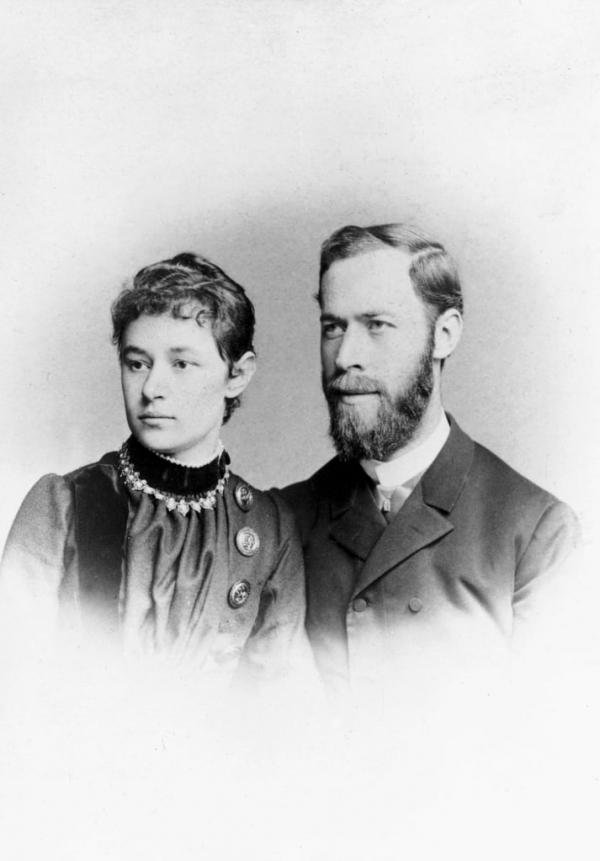 Heinrich Hertz and his wife
Heinrich Hertz and his wife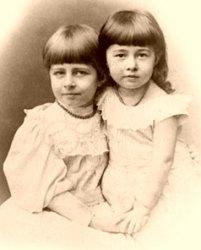 Johann and Matilda, Heinrich's daughters
Johann and Matilda, Heinrich's daughters Fighting old ideas
Heinrich Hertz started researching the theory of electromagnetism while he was teaching at the university. By studying the scientific works of other physicists, especially James Clerk Maxwell, he encountered problems that contradicted the existing theory at that time. Hertz realized that Maxwell's theory of electromagnetism had been severely criticized, and that these experimental criticisms were reflected in his measurements.
The discovery of radio waves by Heinrich Hertz
In 1885, Hertz went to the University of Karlsruhe to conduct physical research and work in a more advanced laboratory. In this field, he quickly gained fame and high scientific prestige. In 1886, Hertz first encountered electric sparks and this new experience led to further research in this field. He used the Riess spiral device and the observation of electric sparks in it attracted him.
Hertz then investigated electromagnetic waves further and produced electric sparks using induction coils. Using a copper wire receiver, he was able to detect the waves. These sparks were caused by the reception of electromagnetic waves that were originally produced by the transmitter. Hertz's important discovery in identifying electromagnetic waves was a turning point in history. Hertz was able to experimentally generate and detect radio waves, but at first he did not pay much attention to this discovery. In fact, he thought that these waves would not be useful for practical applications. But later Marconi filed a patent for wireless communication and unknowingly used Hertz's discovery to gain more prominence.
During his research, Hertz made a great discovery. He succeeded in producing and detecting electromagnetic waves, which today are known as “radio waves”. Through his experiments, Hertz was able to prove that radio waves use electromagnetic wave propagation as a separate method of energy transfer. This great discovery led to the investigation and development of wireless technology and radio communication.
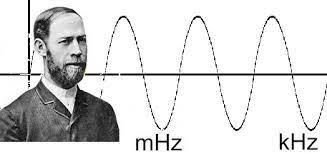 Heinrich Hertz discovered electromagnetic waves
Heinrich Hertz discovered electromagnetic wavesThe influence of Heinrich Hertz's findings in the modern world
The impact of Hertz's findings on meteorology
Hertz was very interested in meteorology. He conducted research in this field and collaborated with his laboratory professor at the Technical University of Munich. Hertz helped investigate the evaporation of liquids and develop a new hygrometer. He had important discoveries that were later justified by others and are of great importance today. Hertz himself believed in the past that the wireless waves discovered by him have no practical use, while in fact these waves have a significant impact on our daily lives.
The impact of Hertz's findings on communication devices
Radio wave technology gave rise to radars, televisions, and satellite communication devices. These technologies are based on the discovery of Heinrich Hertz. The impact of these discoveries in the field of communication and wireless communication has been great. Hertz actually brought the progress of science and technology to a new stage. Today, wireless communications, social networks, the Internet of Things, and many modern technologies are based on the discoveries of Hertz and radio waves.
With the discovery of radio waves by Hertz, the modern world progressed towards wireless communication. We can easily talk to each other in distant places and transfer information at high speed. This ability was impossible before Hertz's discovery. Also, since the discovery of radio waves, television and radio have become very popular due to the broadcasting of radio waves and are considered as one of the main media in the modern world.
In general, Hertz's discovery in the field of radio waves and wireless communication has greatly influenced the development of technology and the progress of societies. As one of the greats of science and physics, Hertz has achieved a lot of scientific and technical heritage that is still used in the field of technology and communication. Radio waves and technologies derived from them have become an important and necessary part of our modern life.
In addition to the discovery of radio waves, Hertz was also interested in other subjects. He performed important activities in the field of lighting and optical phenomena. In addition, Hertz also investigated the effect of photostism and the phenomenon of light absorption by metals. His research and discoveries in these areas contributed a lot to the field of subsequent researches in the physics of light and electromagnetism.
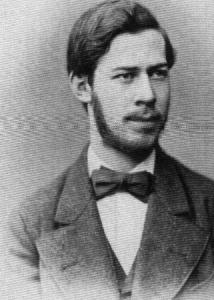 Heinrich Hertz at the age of 21
Heinrich Hertz at the age of 21Memorials to Heinrich Hertz
Because of the great discoveries and scientific legacy left by Heinrich Hertz, memorials were registered in his name, which include:
* In 1930, on the occasion of the efforts of the great scientist Hertz, the International Electrotechnical Commission decided to name the frequency measurement unit after Hertz. Hertz means the number of times an event repeats in one second, also known as cycles per second. This definition was approved as an official unit in 1960 during the General Conference on Weights and Measures.
* A scientific center named Heinrich Hertz was established in Berlin in 1928.
*In 1969, the East German government created a medal named after the great scientist of the 19th century. The following year, in 1987, the IEEE awarded the Heinrich Hertz Medal annually to individuals with scientific achievements in the natural world.
* Other places and geographical monuments are also registered under the name of Heinrich Hertz. These include a high school in Italy, a crater on the far side of the moon, a telecommunications tower in Hamburg and many stamps and banknotes around the world.
Death of Heinrich Hertz
Heinrich Hertz was seriously ill at the age of 35 and was struggling with migraines. Hertz underwent several surgeries, however, the surgeries had no positive results and the young German scientist died on January 1, 1894 at the age of 37. The cause of his death was inflammation of blood vessels caused by immune system problems. Heinrich Hertz was buried in the Olsdorf cemetery in Hamburg.
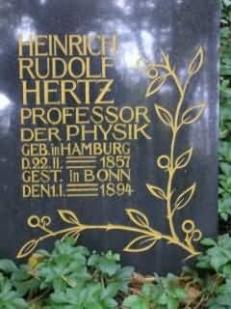 Tombstone of Heinrich Hertz
Tombstone of Heinrich HertzA final word about the German physicist, Heinrich Hertz
With the discovery of radio waves and his research in the field of electromagnetism, Hertz is known as one of the great physicists of history. His discoveries have been very valuable for the development of wireless and radio communication technology. Hertz's name is always remembered with respect and appreciation, and his scientific and technical legacy has a significant impact on the modern world.
compilation: Cover biographical section
